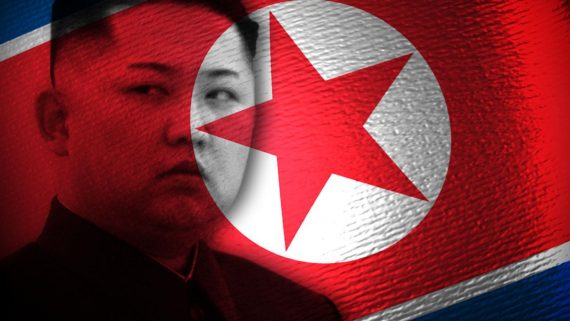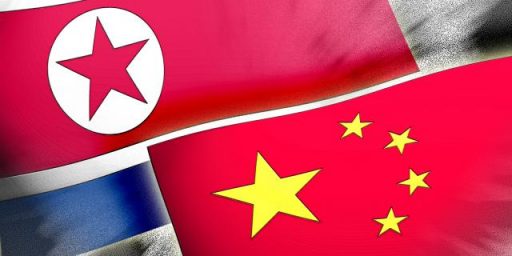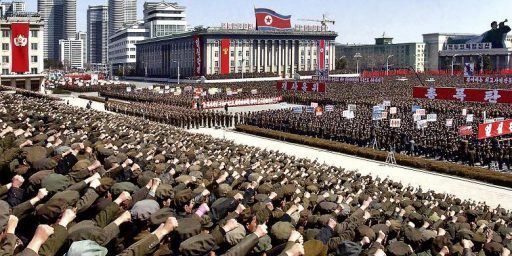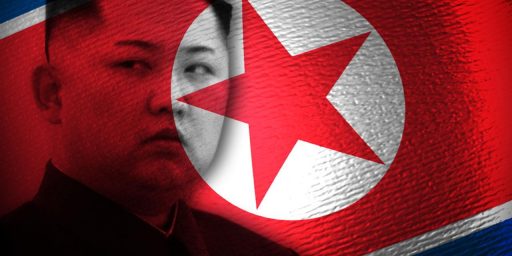Why Negotiations With North Korea Are (Currently) Impossible
Absent significant changes, expecting normal diplomatic relationships with the DPRK is a pipe dream.
With military action seemingly off the table for obvious reasons, many people have been talking about the idea of some form of negotiation that might lead to the North Korean regime of Kim Jong Un abandoning its current course of conduct. Leonid Bershidsky writes at Bloomberg View that this is largely based on a fantasy. In the column, Bershidsky relates the experiences of Russian filmmaker Vitaly Mansky, who in 2013 was seeking to make a documentary in the reclusive country and found himself negotiating with senior government officials:
Mansky’s negotiations were with rather senior officials in the North Korean propaganda machine but perhaps things can go better if the supreme leader himself is involved in talks? Mansky doesn’t think so. “Paradoxically,” he says, “the man at the top doesn’t make decisions, either, because he’s dependent on the dictatorship he has created.” As Mansky tells it, the Kim dictatorship must maintain the cult that was created to sustain it, absurd rules and all; it’s a two-way street of mutual reinforcement. The Communist regime under which Mansky and I both grew up sort of worked like that, too — but North Korea has created a “perfect, flawless” version of the game.
The North Koreans wrote the script for the movie, about a young girl who prepares to join the Korean Children’s Union, part of the ruling Workers’ Party. Mansky’s job was to film a carefully stage-managed version of the girl’s life with her family. True to Vertov’s methods, Mansky filmed the handlers’ instructions, kept the takes they discarded because the characters weren’t sufficiently enthusiastic and captured on camera what he could see of actual North Korean life. The official censors got a memory card with the approved footage. Mansky kept the rest of the material hidden. It is now part of the film, which has garnered attention worldwide. It’s worth watching; the film provides more insight into North Korean life than thousands of pages of news reports, memoirs and academic literature.
(…)
Sanctions against North Korea — the easy response — are ineffective for the same reasons. Russian President Vladimir Putin, who recently said North Koreans would “eat grass” rather than give up their nuclear program, has been listening to the right people. Putin, however, calls for negotiating with North Korea to guarantee its security.
Mansky’s proposal is to leave North Korea alone in its self-imposed isolation — that is, if the civilized world can stand the thought of Kim’s regime committing its endless crime against the North Korean people and bear with the constant taunting of missile launches and threats. He doesn’t believe the regime is inherently aggressive. He describes a propaganda video he saw in North Korea, portraying South Korea as a prodigal son throwing himself on the barbed wire that separates him from his mother, the embodiment of North Korea. “They could easily change that image to a father with wire cutters slashing through that fence,” Mansky says. Kim, Mansky believes, is doing his best to drill hatred of the U.S. into North Koreans’ heads — but also to hold back from any escalation, because it would present an existential threat to the regime.
Mansky doesn’t believe trying to somehow educate North Koreans is possible with the Kim regime in place. He brings up a Russian folk tale of an evil king who achieved immortality by putting his death on the point of a needle which he hid in an egg locked inside a chest. “Intelligence services must get to that needle,” Mansky says. I ask him if he means the dictator’s physical elimination; he demurs — suggesting that, he says, would be going too far. And in any case, even with the regime gone, it will probably take more than a generation for North Koreans to become more like the rest of us: Mansky points out the high suicide rate among North Korean defectors to the south.
Largely in agreement with Bershidsky at his own site, Dave Schuler agrees:
The only real prospect for dealing with North Korea short of risking a nuclear World War III resides in changing China’s incentives to the degree that they’re willing to shut North Korea’s nuclear weapons development program down. That will take determination of a sort that we haven’t shown in decades.
While there’s obviously a massive difference between negotiations over how a documentary is being shot and negotiations regarding North Korea’s nuclear program, or about entering into the formal peace treaty that was never obtained at the end of the Korean War sixty-four years ago, the story that Bershidsky tells about Mansky’s experiences goes a long way toward explaining the reality that any negotiations with Pyongyang would likely face the moment that they started. Simply put, North Korea and the Kim regime exist within a belief system that has two ideas at its core. The first, of course, involves maintaining the myth that the Kim family, extending from Kim Il Sung to his son Kim Jong Il and his grandson Kim Jong Un, are about as close to being a Royal Family as you can get without all the pageantry we see associated with royalty in the United Kingdom, other parts of Europe, and Japan. Indeed, one could argue that the system that exists in North Korea today resembles a medieval absolute monarchy in all but name. The other is the idea that North Korea has been under siege, from its neighbors and most especially from the United States, and that there is a constant threat that troops will pour over the DMZ and seek to conquer the nation, much in the same way that the Korean Peninsula has been conquered in the past by the Chinese and, most recently, the Japanese during World War Two. These two ideas form the core of the myth that the regime uses to control the population. More importantly, as Minsky’s experience seems to reinforce, its something that the leaders and others in the government actually seem to believe, or at least they act as if they do. As a result, any negotiations with North Korea first have to deal with the fact that everything the Kim regime does relies on reinforcing these twin myths and avoiding anything that would bring them into doubt. This makes negotiation with the regime not only difficult but seemingly futile.
Because of this need to constantly reinforce the myths that sustain the regime, the idea that normal seems to be hopelessly naive. Instead, it seems clear that Dave is correct and that North Korea must somehow be persuaded to act within international norms but some method that falls short of war, but which doesn’t just open the door for negotiations that do nothing but help the Kim regime reinforce the lies that keep it in power. As always, China is the key to that strategy given its relationship with Pyongyang and the fact that it is China that plays the largest role in keeping the economy of the DPRK from collapsing totally. To some extent, it has appeared in recent years that Beijing has lost patience with the younger Kim and that has led to some actions on their part that have likely had an impact on the North Korean economy. So far, though, China has been reluctant to take the steps necessary to put real pressure on Pyongyang, and none of our recent President’s has shown the will to be tough enough with China to persuade them to act. Until that changes and the Chinese are able to persuade the Chinese to get the North Koreans to act within diplomatic norms, it’s unlikely anything is going to change, and the likelihood that a crisis on the peninsula could spiral out of control will increase.







A very similar article would have reflected US-PRC relations circa 1968. Yet in 1972 Nixon went to China. Slow, steady progress can be made if we are committed to the process. Things change, and people do not last forever. I am pretty sure that assessments of the security needs of the US in 1984 would have postulated that the USSR would last forever. Let’s keep pushing toward our goal steadily and quietly.
I have a solution. It’s not one that anyone (including me) would actually embrace, but sometimes I like to look just at the underlying power dynamics and find an answer.
We declare that an attack from North Korea will be seen as an attack by China and that we will retaliate not only against NK but against China as well. That’s the way to create an incentive for the Chinese to solve the problem.
While it is comforting to believe otherwise, I don’t see any evidence that China has that sort of control over North Korea. Nor is there any particular gain to China in shutting it down even if China could.
Good analysis of the situation, all the way around. Thanks Doug.
A separate part of NK’s thought process is that events in this millennium have shown that the payoff for acting in accordance with international norms is small to negative. Getting rid of weapons of mass destruction did not prevent the US from overthrowing the governments of Iraq or Libya, and Trump is talking like freezing Iran’s nuclear program is not an assurance that we will not attack them, either. We may end up needing to put more on the table than you need to get rid of your WMD or we will invade you to get an agreement.
@michael reynolds: “We declare that an attack from North Korea will be seen as an attack by China and that we will retaliate not only against NK but against China as well. That’s the way to create an incentive for the Chinese to solve the problem.”
This sounds like the kind of sound, clear-minded approach that guaranteed war would be impossible in Europe around 1913.
I mean, game it out for two or three movies. Let’s say NK does decide to throw a missile our way. Now the Chinese government has about ten seconds to decide if this means the US has just declared war on China — and might quite reasonably choose to attack us rather than wait for our inevitable assault.
All you would do with a proclamation like this is put the fate of two superpowers — and thus, the world — into the hands of Kim. Why would you ever give him this kind of power?
On the other hand, it does sound like something Trump might like.
Short of a massive war, which may well involve us fighting China, and nuclear weapons being lobbed about, we have no way to force North Korea to give up their nuclear weapons program.
From the examples of Saddam Hussein and Col. Gaddafi, we have also demonstrated that any dictator who does give up their nuclear ambitions is going to get knocked off when the US gets tired of them. There is no retirement for dictators either. So, to protect his own chubby little life, Kim needs the weapons.
Sanctions and isolation hurt the North Korean people more than the government, and incentivize the North Koreans to sell their nuclear technology, so they can afford to buy food or luxury items on the black market.
Negotiation won’t get rid of the North Korean nuclear program. Nothing, short of that war that might expand to World War III will. Our choices are how do we want to deal with a nuclear armed North Korea, and what behavior we want to incentivize.
An isolated, belligerent, nuclear armed regime seems like a bad thing. I would encourage negotiation to reduce the sanctions, and open up North Korea. De-escalate the situation on the peninsula to reduce the need for North Korea to lash out. And go after the North Korean regime by embracing them, and showing the people a better way of life.
Or we can just leave them growling and angry and cut off and hope that they don’t sell their weapons, or do anything unexpected and bad.
@wr:
Oh, it’s absolutely Trumpian. It’s Psychopath 101. But it’s not as doomed to failure as you think. China has an array of reasons to support North Korea, but it has no reason to risk nuclear war with the US over NK, so they would use their influence and if necessary raw power to shut down the NK program.
Or not.
That’s the fun of playing psychopath. You find the straight line solution first, worry about the consequences – for example giving the world a stroke when they see what you’re up to – later. Or never.
Tell you what, though: it would have a better than even chance of working. It alters the power flow by dramatically raising risks to China thus adding huge incentives to finding a solution, incentives the Chinese don’t currently seem to see. It would also add major fears to NK because they’d have to expect that in the event of a proposed attack on the US, China would hit them from the flank.
You follow up with diplomacy, a promise that whatever comes the US and SK will not move forces any closer to the Chinese border and signal a willingness to Finlandlize whatever regime survives in NK, or if re-unification is the end point then agree to limits on SK forces. That reassures the Chinese, reducing their negative incentives.
Further, if China takes down Kim and the NK threat disappears, Japan and SK have substantially less reason to ally with the US against China as our military protection would be less of an immediate issue. So win-win for China, win for us, win for SK and Japan. The only teeny, tiny, wee little catch being the possibility of global nuclear war perhaps ending in the annihilation of human civilization.
How about trying back channels? Are there lines of communication with Jong’s close advisors and cabinet members?
@michael reynolds: Dude, you gotta cut back on the blunts, man. Just sayin’. (And why are you wasting a good cigar that way anyhow?)
@Tyrell: Do you know who they are? If so, the administration and State Department need you desperately.
If you are personal friends with Dennis Rodman and think he could help get to those back channels, by all means, encourage him to approach Der Trumpenmeister.
@Tyrell:
Dennis Rodman isn’t returning calls.
@Just ‘nutha ig’nint cracker: Well, I would think that maybe Bill, George W., Rodman, Gates, and a few others might possibly be able to make some sort of breakthrough.
Worth a try?
Interesting that no one actually offered a practical explanation for why my plan would not work. Genghis Khan would have agreed with me, any smart psychopathic conqueror type would agree because I’m right, it would shift all the incentives and increase US leverage (while incurring perhaps elevated risk.)
It’s a small lesson in how Trump beat the Left. We look at right and wrong, moral and immoral, he only looks at the power dynamics, says and does things for the sole purpose of increasing his own power and wealth. Thankfully he’s too stupid and pathetically narcissistic to be effective because if he were smart he might well prevail. The weakness of the morality-driven Left is that morals rest on common perceptions, on widely-held beliefs, beliefs which can be set aside on a whim. And that is power only so long as a moral-ethical consensus holds. We’re so deep into call-out culture, into naming and shaming that we are blind to the outside-the-box effectiveness of a purely power-focused analysis.
We teach children that when they are called names they should respond with a dismissive, “So?” That’s where the far Right is now. “Go ahead, call me a racist, sexist, etc…” Once the moral consensus is repudiated the Left has nothing. It’s not enough to be right, you also have to win.
So far the moral consensus is holding for about 60% of Americans. But if that makes you feel comfortable you’re more of an optimist than I am. The Overton Window is mobile.
@michael reynolds: The practical argument against your plan is that it only works if the Chinese react in the way you want them to. There is one way for this to go right and a million ways for it to fail, and the consequences of failure are beyond catastrophic.
Let’s say President Reynolds issues this threat. Then NK tosses a missile somewhere. What do you do? By your own word, you are now obligated to attack/bomb/invade China, which means a war on the scale of WW2. And for what? To back up a bluff? Or you don’t attack, and then your threats are revealed to be meaningless.
All this pronouncement does is eliminate basically all of your options and hand over complete control of the situation to North Korea. Genghis Khan wouldn’t agree with you — he’d laugh at you, probably as you were roasting on a spit.
And this has nothing to do with your standard left/right/moral/immoral frame. It’s just a dumb move with a great potential downside and upside only in fantasyland.